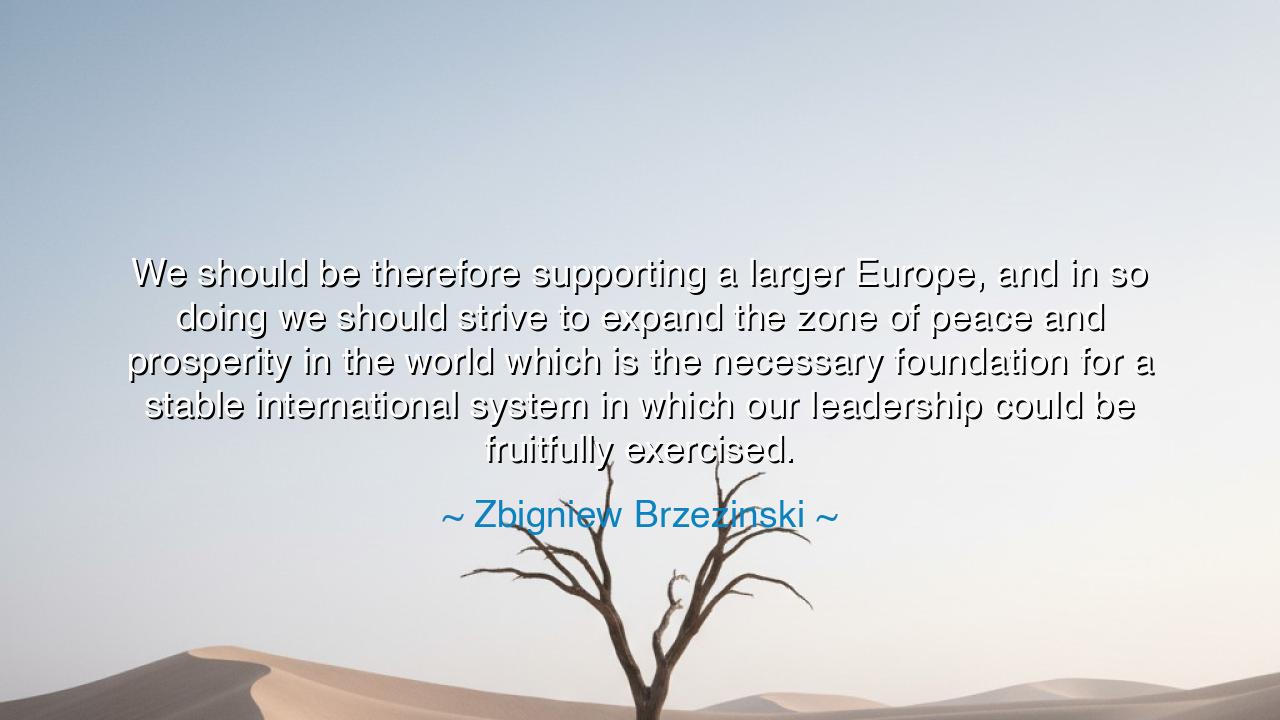
We should be therefore supporting a larger Europe, and in so
We should be therefore supporting a larger Europe, and in so doing we should strive to expand the zone of peace and prosperity in the world which is the necessary foundation for a stable international system in which our leadership could be fruitfully exercised.






The statesman Zbigniew Brzezinski, a man of vast intellect and vision, once declared: “We should be therefore supporting a larger Europe, and in so doing we should strive to expand the zone of peace and prosperity in the world which is the necessary foundation for a stable international system in which our leadership could be fruitfully exercised.” In these words, he spoke not merely of politics, but of the moral architecture of civilization itself. For beneath the language of policy lies a universal truth — that the strength of any power, and the justice of any leadership, must rest upon peace, upon prosperity, and upon the shared dignity of nations. Brzezinski’s call was not for conquest, but for cooperation; not for dominance, but for the building of a world where leadership is measured by how much stability and hope it can create.
The origin of this insight lies in the long shadow of war that haunted the twentieth century. Brzezinski, born in Poland and educated in the United States, lived through the age when Europe was torn apart twice by global conflict and then divided by an iron wall of ideology. He saw firsthand the fragility of peace and the perils of division. When he spoke of a “larger Europe”, he did not mean simply the enlargement of borders or alliances, but the expansion of understanding — a Europe united not by conquest but by shared values, shared security, and shared prosperity. In this, he echoed the ancient wisdom that the mightiest empires fall when they forget that peace is not the absence of war, but the presence of justice.
To expand the zone of peace and prosperity, in Brzezinski’s view, was not merely a diplomatic goal — it was a moral obligation. The philosopher-statesman understood that instability anywhere threatens stability everywhere, and that freedom confined to one continent is freedom at risk. The foundation of a stable international system, he said, must be built upon inclusiveness and opportunity. Just as the ancient Romans built roads that linked their provinces to bring both commerce and culture, so must modern nations build bridges — political, economic, and spiritual — that unite peoples rather than isolate them. For peace is not preserved by walls; it thrives in connection.
We may recall the story of George C. Marshall, whose vision after the Second World War gave birth to the Marshall Plan — a plan not of vengeance, but of restoration. Rather than punish the defeated, he sought to rebuild them, binding former enemies into a web of mutual prosperity. From that act of generosity rose a new Europe, resilient and peaceful, bound together by trade, trust, and shared destiny. This was the living proof of what Brzezinski later preached — that the true exercise of leadership is not domination, but creation; not ruling through fear, but guiding through example.
The zone of peace and prosperity that Brzezinski envisioned was not a static idea but a living, expanding force — one that called upon leaders to look beyond their borders and their lifetimes. To build such a world requires patience, courage, and restraint. It demands that nations use their power not as a weapon, but as a stewardship. Just as a gardener tends the soil so that life may flourish, so too must great powers nurture the conditions in which smaller nations may grow free and secure. Only then can leadership be, as Brzezinski said, “fruitfully exercised.”
There is a deeper wisdom here, one that transcends diplomacy: the understanding that true leadership is service to the greater good. It is easy to command through might; it is far harder to lead through moral vision. The world, like the human soul, is made stable not through domination but through balance — the balance between ambition and humility, between self-interest and shared purpose. The ancients knew this truth well: that empires sustained by greed crumble, while those guided by justice endure.
Let this be the lesson carried forward to all who seek to shape the world — whether in governance, community, or the simple affairs of daily life. To lead is to unite. To prosper is to share. To create peace is to extend understanding even to those who differ from us. Each of us, in our own realm, can expand the zone of peace and prosperity — by choosing dialogue over division, empathy over pride, cooperation over contempt.
For in the end, as Brzezinski knew, the greatness of a nation — like the greatness of a soul — is not measured by how much power it holds, but by how much peace it builds. The world will remember not those who ruled by fear, but those who dared to plant the seeds of unity in the soil of an uncertain age, trusting that from them would rise a future more stable, more just, and more profoundly human.






AAdministratorAdministrator
Welcome, honored guests. Please leave a comment, we will respond soon